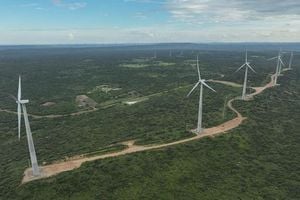Alberta is stepping up its game to attract data centres as their demand skyrockets across North America. The province is not only offering unique advantages, but it is also facing significant challenges related to its energy infrastructure.
With artificial intelligence (AI) usage on the rise, the necessity for data centres—physical spaces where digital information is stored—is greater than ever. Tech companies are hunting for reliable electricity sources, making Alberta one of the contenders aiming for investment.
This move could mean considerable financial gains for Alberta, but concerns linger about the environmental impacts of power-hungry data centres, especially considering the province's reliance on natural gas. “You really need to get an understand of what the return on investment would be for the province,” noted Alberta Finance Minister Nate Horner.
Although Alberta boasts some attractive features for data centre development, most current installations are concentrated in Ontario and Quebec. These provinces benefit from their larger populations and Quebec's low-cost renewable electricity sourced primarily from hydropower.
Representatives from Alberta recently made promotional trips to Silicon Valley, showcasing the province as “a prime location” for building AI data centres. The region’s technology minister, Nate Glubish, emphasized the potential, stating, “This is an excellent opportunity to promote Alberta as a prime location for AI data centres.”
While Alberta backs aggressive investment strategies, there are voices of caution within the government. Horner pointed out existing challenges with Alberta's electricity grid, expressing worries about how new data centres could affect utility bills for residents.
The demand for data centres is climbing rapidly, propelled by cloud service providers and AI companies. With many aspects of modern life relying on digital storage, capturing this market could mean enriching Alberta economically.
Currently, the Alberta Electric System Operator (AESO) has seen a spike in applications for data centre projects, indicating growing interest. The projects under consideration represent around 5,000 megawatts, showcasing legitimate enthusiasm for development.
Alberta’s energy solution lies chiefly within its natural gas power plants, which predominantly supply electricity to these data centres. Enhanced demand for natural gas could potentially lead to job creation, tax revenues, and benefits from royalties collected on natural gas extraction.
Michael Belenkie, CEO of Entropy, highlighted the dynamic nature of the electricity market. “The electricity demands right now are rapidly increasing as we electrify everything,” he said, indicating the need for efficient energy solutions.
Data centre projects require substantial power, and Alberta's natural gas resources are poised to meet this growing demand rapidly. Belenkie added, “Importing the demand to make use of the trapped energy is really an elegant solution for us in Alberta.”
While the drive for development is strong, Alberta must also navigate the uncertainties surrounding its electricity policy. Current reforms targeting the deregulated system could impact both potential investors and local residents.
Data centre developers are primarily focused on accessibility to electricity. According to David Cervantes from real estate firm CBRE, if power is readily available, it can outweigh concerns about environmental impact, at least initially.
Alberta has recently made strides to clean its energy sources, shutting down all coal-fired power facilities. Nevertheless, the province's grid remains heavily reliant on fossil fuels, leading to worries it may deter potential investment from global tech companies.
Despite previous efforts to reduce pollution, there remains skepticism about how the expansion of gas plants affects overall carbon emissions. “Alberta is working very hard to improve its power profile,” Cervantes emphasized, recognizing both challenges and advancements.
The cost of natural gas varies significantly, currently priced lower within Alberta compared to Europe and the U.S. This price advantage, coupled with the province's unique geological features helping with carbon storage, could lure tech firms to Alberta.
Some companies are already eyeing Alberta as their next base of operations. After all, Alberta has the requisite underground space to support carbon capture technologies, which are seen as necessary for minimizing emissions.
Importantly, the existing challenges involve balancing energy needs with environmental responsibilities. Belenkie remarked on this issue, noting, “Our electricity system is still largely fossil fuel-dependent.”
The capacity of Alberta's grid stands at approximately 21,000 megawatts, and many potential projects are currently at the preliminary development stage. Investors are waiting to see how many of those projects will come to fruition.
The province's pursuit to attract data centre investments also highlights aims for technological development. By nurturing this nascent sector, Alberta could position itself as not just another market, but as Canada’s leading hub for data storage.
Regulatory concerns surrounding electricity costs and taxes could put the brakes on some ventures. Frequent alerts from the power grid citing potential shortages during peak demand periods have raised alarms among residents.
Notably, the need for power often peaks during extreme temperatures, when the grid is pushed to its limits. With new natural gas power plants coming online, Alberta is taking steps to increase its energy supply, aiming to alleviate these grid concerns.
The potential expansion of energy infrastructure could make Alberta not only competitive but also resilient to fluctuations in demand. “The problem has been alleviated with new natural gas plants,” stated one energy expert.
Overall, Alberta's balancing act of capitalizing on the lucrative data centre market and maintaining environmental standards is complex. The government's approach will significantly impact the future of energy consumption and the economy.
The existing reliance on fossil fuels paired with aspirations for greener practices poses challenges but also presents opportunities. The evolution of Alberta’s energy profile and its role as a potential epicenter for data storage is just beginning to take shape.
While the prospect seems bright for Alberta's data centre ambitions, stakeholders must remain vigilant about both financial returns and ecological footprints. How they navigate this new industrial frontier may set the tone for their energy future and environmental responsibilities.



